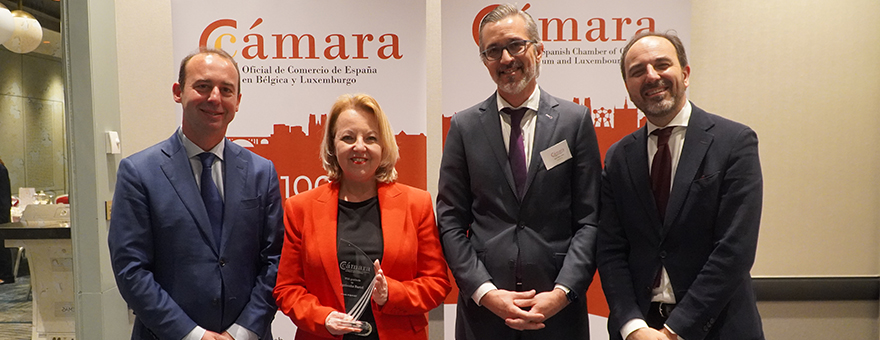Agnieszka Bartol defends the necessity of facilitating the digitalisation of SMEs by simplifying regulation
On Thursday 24 April, the Official Chamber of Commerce of Spain in Belgium and Luxembourg held a new lunch-debate in the framework of its “Business Circle” platform, in which the Ambassador Permanent Representative of Poland to the EU, Agnieszka Bartol, spoke about “Increasing the competitiveness of the EU through the digitalisation of SMEs”.
After the welcome cocktail, the President of the Chamber, Pablo López-Álvarez, opened the lunch by briefly introducing the speaker and thanking her for her presence at the event during the busy final stages of the Polish Presidency of the Council of the European Union.
The Ambassador Permanent Representative of Spain to the EU, Marcos Alonso, wanted to highlight his Polish counterpart’s “great ingenuity and ability to see the big picture” when it comes to tackling complex discussions during debates in the Council of the European Union.
Then, Ambassador Bartol began her speech by ensuring that the European institutions are failing to explain to SMEs why it is important to go digital. “Digitalisation is not an option, it is a matter of survival that increases the productivity and efficiency of companies,” she stated.
As a result of this failure to raise awareness, the speaker pointed out that there is a lack of digital skills in European society and that “many SMEs see digitisation as an expense and not an investment”.
Reducing administrative burdens
Moreover, there is complex legislation and excessive administrative burdens associated with adopting digitalisation. “We have to show our small businesses that this is not a burden, but a way to grow”, the ambassador added and defended the need to simplify regulation.
Bartol also reminded participants of the conclusions of the Draghi report, that warned of the structural loss of competitiveness that Europe is facing. In this regard, the speaker ended her speech by encouraging the facilitation of innovation and the emergence of new business ideas through the adoption of a proactive stance to make legislation simpler and to make it work in favour of SMEs.
The presentation was followed by an extensive Q&A session in which topics such as the digitalisation of the public sector and legislative barriers in different parts of the EU were discussed.


